Quite naturally, Loneliness has become a serious public health problem for the millennials. Here are some pertinent facts about loneliness that can help you to understand how It affects the mind and body.
Human beings are social beings and we are wired to share our stories and feelings in person.
What do we do when we interact with others in person?
We use our body to communicate our intentions, emotions and feelings. Our gestures, facial expressions, tone of voice, body language are all effective ways to communicate with one another.
We share mirror neurons that allow us to imitate each other’s feeling consciously or unconsciously.
For example when I see you smiling, mirror neurons for smiling fire up in my brain, initiating the activity of smiling. I experience immediately and effortlessly what you are feeling. And when you see me matching your emotional state, you feel understood and this becomes the basis of strong bonds that we form with each other.
Our brains and bodies are wired for heart based face to face interactions for our overall being and development but due to the advent of social media, digital interactions have take over the personal face to face connect.
And therefore, the paradox of the millennial generation is that with the substantial increase in online friends & followers, the percentage of people who feel lonely has also risen exponentially.
It is estimated that over 40 % of the population will feel the pangs of loneliness at some point or the other.
There has been a lot of research to study the causes and effects of loneliness in the millennial generation.
Here is a list of 10 pertinent facts about the loneliness that can help you to understand and combat the menace of loneliness:
1. It is not about the quantity but the subjective quality of your relationships

According to psychologists, there are two types of loneliness: Subjective and objective
Objective loneliness refers to being physically isolated while subjective loneliness refers to the feeling of being alone even when you’re physically or socially surrounded by lots of people.
Subjective Loneliness does not depend on the number of friends or followers you have on social media but the quality of your closest and intimate relationships.
It is about how connected and understood you feel in your relationships.
You could be having a large number of friends in your social circles but if you do not find anyone with whom who you can connect deeply mentally or emotionally; you are bound to feel lonely even in a crowd of superfluous social contacts.
Read Loneliness: Surprising Ways It Impacts Our Health and Wellbeing
2. Over 60% of lonely people are married
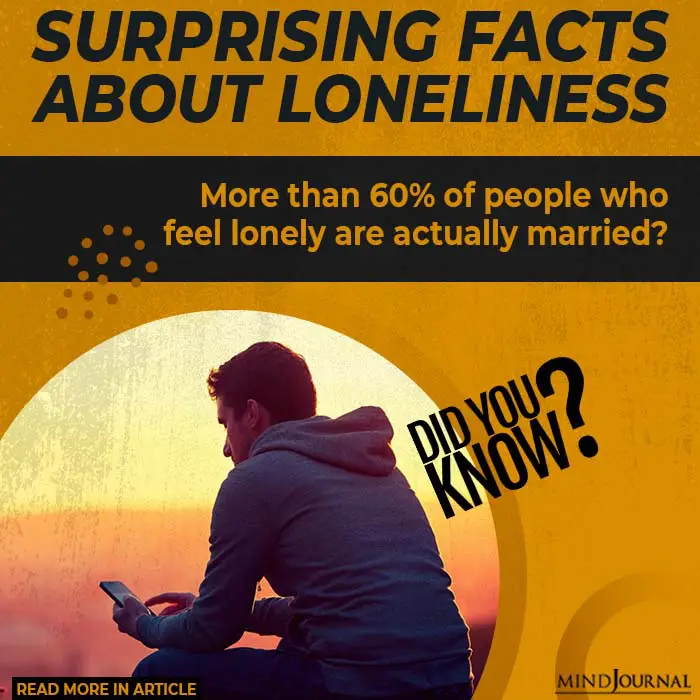
Did you know that more than 60% of people who feel lonely are actually married?
Research conducted by a lot of psychologists shows that when married couples start feeling that they cannot share their deepest thoughts and feelings with their significant other, they feel highly disconnected and alone despite of being in a congenial relationship.
Loneliness starts to creep in when one or more partner starts to feel that their spouse cannot offer the deep connection they desire.
One or more of the partner might start to feel unheard, unloved and devalued or simply monotonous with a lack of novelty in their daily interactions, gradually slipping into loneliness.
3. Loneliness affects our perception of reality
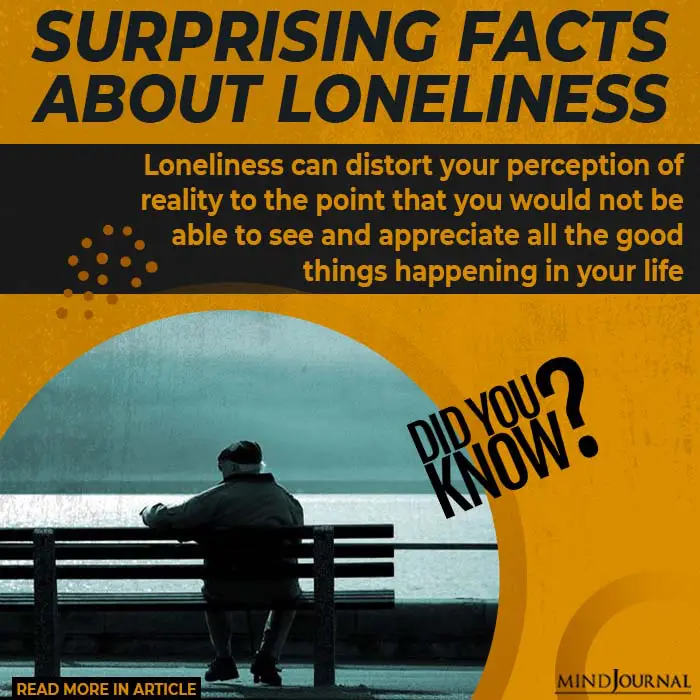
When you feel lonely, you can start to feel hopeless and dejected and start to view things from a pessimistic point of view.
Loneliness can distort your perception of reality to the point that you would not be able to see and appreciate all the good things happening in your life.
It can become like a dark cloud of negativity that can completely distort your perception of the reality.
You start seeing everything in negative light, focusing only on the drawbacks of everything. Your logical reasoning, power to see the pros and cons and taking good decision, all gets hampered by the feelings of loneliness.
4. Loneliness can be contagious
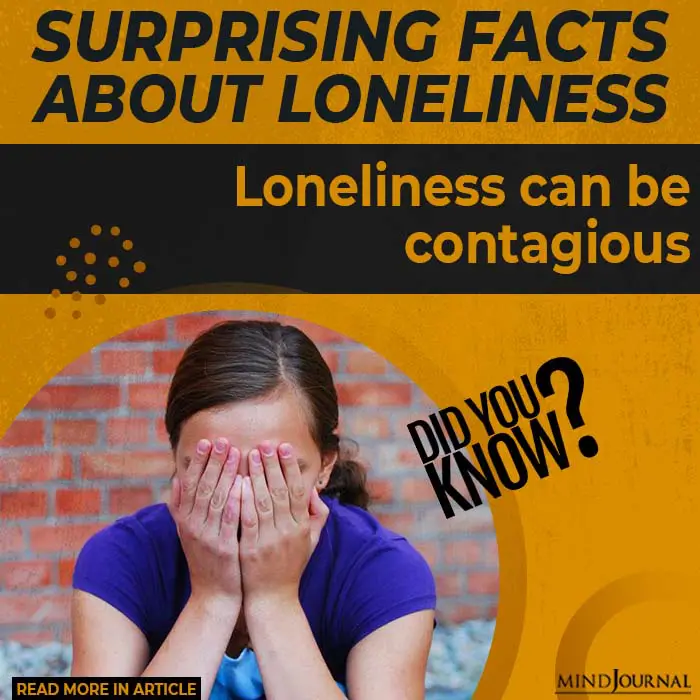
Loneliness can get contagious and it has a certain social stigma attached to it.
It has been found by a study that it’s not only the lonely people who get pushed to the periphery of social circles but also their friends due to social conditioning and stigma attached to it.
Read 5 Truths About Loneliness And How To Deal With It
5. Loneliness can have physical effects
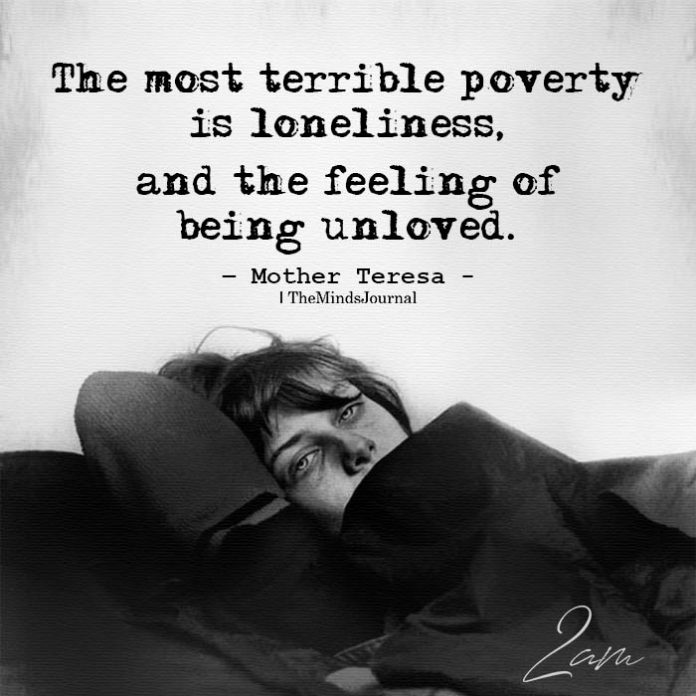
Loneliness can make our bodies feel under attack and can have adverse physiological effects. The effects of loneliness are almost similar to being in stress.
Our mind and body functions interdependently. When one stays in loneliness for a long span of time, our bodily resources to restore the lack of physical equilibrium will be slowly depleted leading to physical symptoms like stomach ache, headache, numbness in arms etc. It can increase blood pressure and cholesterol and put our nervous system on hyper active mode.
Chronic loneliness can lead to various psychiatric disorders like depression, alcohol abuse, child abuse, sleep problems, personality disorders and Alzheimer’s disease. (1) It can also cause gastrointestinal problems like lack of appetite, nausea, stomachache, stomach ulcers, indigestion etc.
6. Loneliness can affect your immune system
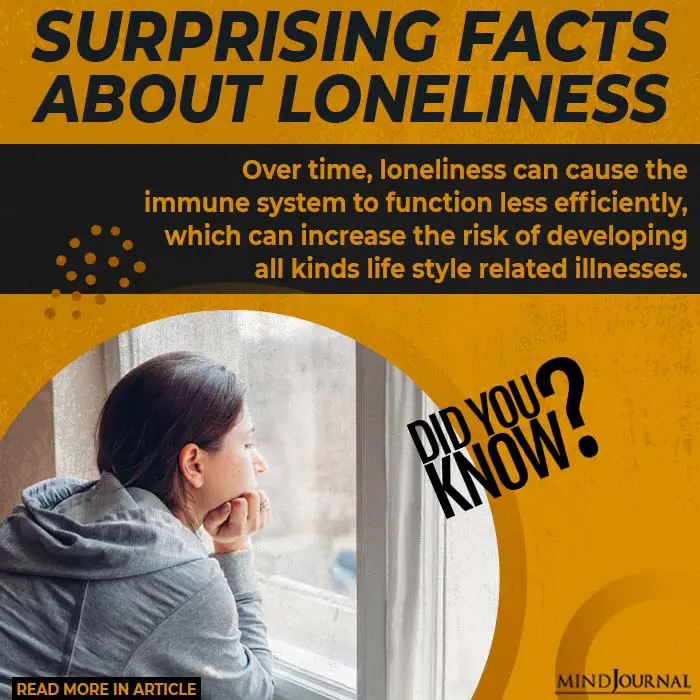
When our body is under extreme stress, it signals our neurological system and immune system to stay on hyper alert mode.
Our immune system remains highly under pressure, working at its highest potential, when we are in chronic loneliness, to keep helping the body and the mind to cope with the situation. But once it’s depleted of its resources, the body starts signaling us to mend the situation through psychosomatic symptoms mentioned earlier.
Over time, loneliness can cause the immune system to function less efficiently, which can increase the risk of developing all kinds life style related illnesses.
7. Loneliness can be as dangerous as smoking

According to some psychologists, loneliness can be as dangerous as smoking and can adversely affect our health and longevity.
Holt-Lunstad published two major studies that establish the overall effect of loneliness as a risk factor for risk or early death.(2) Holt-Lunstad’s first study involved 3 lakh participants showed that scoring low on the indicators of social connection carried a similar risk to smoking up to 15 cigarettes per day. Participants with stronger social interactions were found to have a 50% increased likelihood of survival.
The second study involved 3.4 million participants and focused on subjective loneliness and actual, physical social isolation, and found that both can lead to a 30% increased risk of premature death.
Other studies have also shown that chronic loneliness can increase the risk of early death by 14%.
Read Loneliness In Children: This Is What You Can Do As A Parent
8. Poor cognitive performance

Another surprising facts about loneliness are that it can lead to poor cognitive performance and even dementia.
Loneliness is the perceived experience of social deprivation, distinct from objective social isolation, that has been associated with accelerated functional decline and increased mortality in older adults (Perissinotto et al., 2012). Loneliness has also been found to predict greater cognitive decline over 4–10 years (Shankar et al., 2013; Tilvis et al., 2004) and a doubling of the risk of Alzheimer’s disease (AD) dementia (Wilson et al., 2007). (3)
9. Loneliness can make our bodies feel colder
Another surprising fact about loneliness is that you can actually feel colder when you are lonely as your body temperature decreases.
Researchers suggest that this could be due to genetic memory, as our ancestors would have felt after being ostracized from the warmth of the tribe.

10. Obsession with Material possessions
According to a number of recent studies, a lot of people get obsessed about material possessions to combat their loneliness. They focus more on possessing cars, house and other valuables to fill the void of loneliness.
Shopping and acquiring things become our tonic, our magic pill to curb loneliness. Solution for loneliness, such as shopping, binge eating and is often momentarily beneficial but are detrimental in the long run.
Over the time a person realizes that it’s impossible to find solace in a conversation with one’s costly wrist watch. This leads to “a loneliness loop” that many economists have taken interest in since decades.
Many economists have suggested there are actually three flavors of materialism: “acquisition centrality, possession-defined success, and acquisition as the source of happiness.”
Lonely shoppers who splurge to fill their sense of defeat and insecurity are actually deluding themselves.
Pieters found, valuing material possessions as a measure of success and as a medicine for happiness were associated with increases in loneliness over time, and loneliness in its turn was associated with increases in these subtypes of materialism.
What do you think? Let us know in comments.
Please share this article with anyone who you may think will find it valuable and helpful.
Related video:
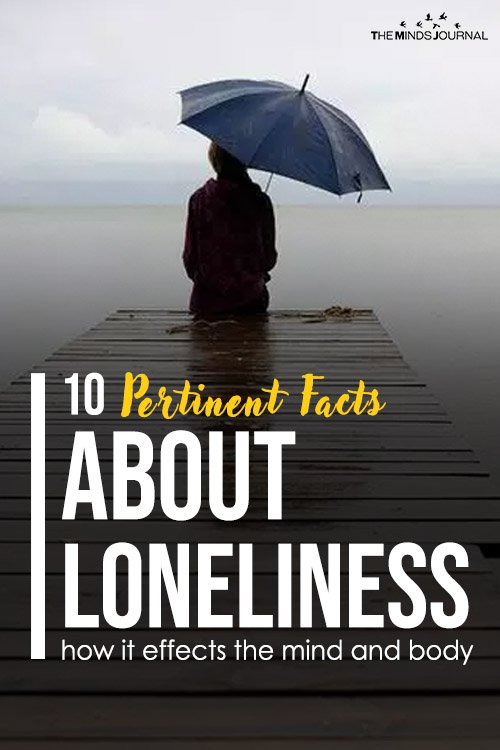










Leave a Reply
You must be logged in to post a comment.